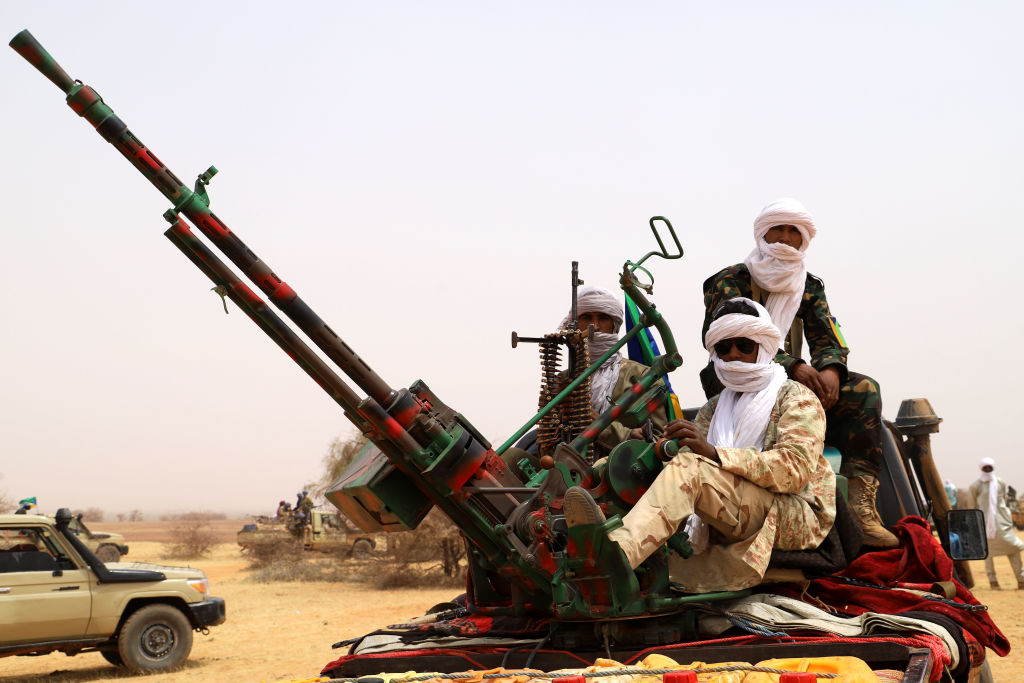ADF STAFF
Mali’s military junta has repeatedly pledged to restore security to the country after using the terror threat as justification for coups in 2020 and 2021. Instead, the violence has gotten worse.
Last year, Mali recorded a 38% increase in violence targeting civilians, according to Armed Conflict Location and Event Data (ACLED). Deadly clashes between security forces, terror groups and Tuareg rebels have continued this year.
In August, Jama’at Nusrat al-Islam wal-Muslimin (JNIM), the main terror group operating in Mali, launched a widespread offensive in central, western and northern Mali. This followed a fierce July battle during which JNIM and Tuareg rebels killed up to an estimated 80 Russian mercenaries.
The battle, fought near the border with Algeria, accounted for Russia’s biggest loss in Mali since it deployed there in December 2021. Two members of the Malian Amed Forces (FAMa) were also killed during the five-day battle, while 10 were wounded, and two armored vehicles and two pickups were disabled, according to FAMa’s website, which said about 20 terrorists were killed.
JNIM’s August offensive overran numerous Malian military positions in the Bandiagara, Kayes, Mopti and Timbuktu regions, leading to a 5% increase in overall violence in August compared to July, ACLED reported. In retaliation, Malian forces conducted more than a dozen drone strikes on JNIM positions. Civilians were among the 49 fatalities.
Researchers with the Institute for Security Studies, University of Nigeria and University of Pretoria identified several factors driving Mali’s continuous chaos: the government’s inability to adapt to the changing dynamics of counterinsurgency operations, limited military assistance, foreign influence on counterinsurgency efforts, and a failure to appreciate the significance of terrain and air capability operations.
“To turn the tide against rising insecurity, Malian counterinsurgency forces must adapt and respond effectively to these factors,” the researchers wrote in The Conversation.
That will not be easy. The surging violence in northern Mali is complicated by the resurgence of the Tuareg rebels, who had agreed to the Algiers Accords in 2015, which provided a framework for peace but was never fully implemented.
The area, on the Western flank of the Sahel, is in a zone of ungoverned spaces, the researchers noted. Tuareg and extremist factions have long been active there. The 2,000-kilometer northern border with Algeria is poorly secured and its flat terrain makes it easier for insurgents to see an enemy approaching.
The Malian military doesn’t have enough resources and advanced military assets to replace the security architecture established by defunct military missions. “Nowhere is this more evident than in the country’s air capabilities,” the researchers wrote, as airpower, such as light attack aircraft, helicopters and combat drones, is critical to counterinsurgency operations.
International peacekeeping forces in Mali have left since the junta took power. The United Nations Multidimensional Integrated Stabilization Mission in Mali, or MINUSMA, ended in December 2023 after more than 10 years. The last French troops left Mali in 2022 after a nine-year deployment. France blamed the junta for obstructing its military operations.
The departure of these forces threatens to reverse any security progress made over the past decade.
“This is because Mali has moved from multiple military partnerships to a sole dependence on Russia,” the researchers wrote. “Russia is currently incapable of providing support to Mali due to the war in Ukraine.” The possible role of foreign actors may also cause strategic and operational failures in counterinsurgency operations “through proxy warfare, supply chain disruption and encouraging defection,” they added.
Military juntas in neighboring Burkina Faso and Niger, where Russian fighters have also been deployed, have struggled to contain terrorism. Incidents of “political violence” in those countries and Mali collectively rose 5% last year, a 46% increase over 2021, ACLED reported.

